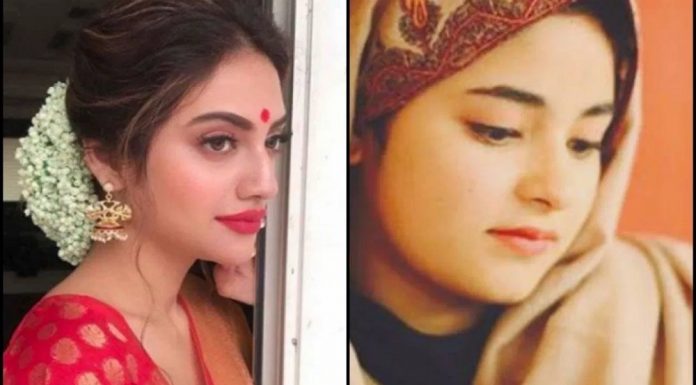Social media witnessed a backlash when Zaira Wasim, the young actress who won national fame for her role in the film Dangal, informed the public through her twitter handle that she was leaving the tinsel world and returning to her religious roots. There were several arguments for and against her decision.

Image Courtesy: opindia.com
First, there were the ‘progressive’ Sanghis, who attacked her and wrote as if she has turned ‘radical Islamist’. Second came the ‘secular’ ‘liberals’ like BarkhaDutt and others, who felt that Zaira’saction would hurt the prospects of those Muslim girls who were aspiring to do ‘something’. Then, there were Muslim friends, who felt that she had done the right thing and lastly, there were the ‘secular’ ‘liberal’ Muslims, who felt that Ziara’s act has hurt the community which is under tremendous pressure from the right wing Hindus.
Let us start by understanding that this is a very personal decision, and others have no right to interfere in it. Why should it matter to us whether an individual does or does not find salvation in his or her religion?Why should Zaira’s becoming ‘religious’ hurt the prospects of other Muslim girls? On the same note, did the prospectus of Muslim women growmanifoldwith the entry of WaheedaRahman, Mumtaz or Zeenat Aman, intofilms?
The hypocrisy of people like BarkhaDutt is that none of them have ever written about why young Hindu girls are now becoming Sadhvisand then delivering hateful speeches. And will the people,who go to listen to these young Sadhvis like Radhe Ma, aspire to become like them?Or do they go there out of pure superstition, or due to other business interests? How many of these ‘secular’ ‘liberals’ have writtenabout a 12 year old Jain girl Khushi, who got 97% marks in her sixth class but decided to become a monk, in Surat, earlier in May this year? Why has there been no hue and cry over this absolute violation of a child’s rights?This is not an isolated incident. Each year, there are many such cases in the Jain community but we never call Jains one of the most conservative communities or say that such traditions are absolutely uncalled for in the modern world. If we go by the narrative in the media, Khushi Shah was being termed as a wonder girl, who has left all the ‘good things’ of life.
Her father felt proud of her. How many TV channels ran the show and took on the leaders of Jain community for such practices?Khushi was only 12 years old, clearly a minor, and the National Child Rights Commission should have investigated the matter.
Zaira is anadult, unlike Khushi, but our media, which is purely a commercial or money-minded media in today’s time, has only one agenda, which is to construct stories about Muslims. If there is none, then they will create one and even debate on it to put continuous pressure on the community and portray it as a purely medieval community without any sense of modernity.
The problem is not merely the right wing Sanghi trolls but also the self-proclaimed guardians of Indian culture. Recently, a West Bengal TMC leader and MP, Ms NusratJahan was trolled. Nusratis married to a Jain business man and was seen in traditional bridal attire with her partner. There were two kinds of reactions, particularly related to her attire. Some Hindus said that there was a Fatwa against her for wearing sindoor and mangalsutra after the marriage. On the other hand, the ‘seculars’ were defending her, calling her ‘progressive’, as she had crossed ‘religious boundaries’ and was an example that Muslims too could ‘respect’ and ‘celebrate’ Hindu culture.
The problem lies not in Zaira’s or Nusrat’s personal choices but in our attempt to ‘define’ them according to our convenience. Nusrat and Zaira have made their choices. Just by going back to Islam,Zaira does not become regressive, in the very same way that, just wearing sindoor and mangalsutra does not make Nusrat a champion of secularism or Indian culture. The fact of the matter is that sindoor and mangalsutra are not symbols of women’s empowerment but of repression, of a regressive anti-woman brahmanical culture.
It is time for all of us to get out of our tendency to ‘define’ others. Let people enjoy their choices, whether religious or non-religious. India, ultimately, will have to work on constitutional morality as only that would ensure rights for all as well as unity and integrity of our nation.
